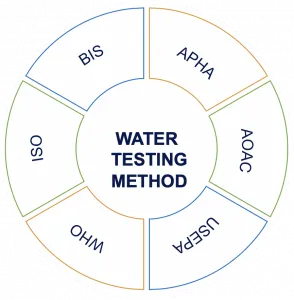At FARE Labs Pvt. Ltd., we prioritize the safety and quality of drinking water through comprehensive testing services. Contaminants such as Giardia and Cryptosporidium, along with MS phage, pose significant health risks, particularly in water supplies. Our advanced testing methodologies, including RT-PCR for protozoan detection and USEPA Method 1602 for MS phage, help ensure compliance with national and international standards, safeguarding public health.
Understanding the Pathogens
| Pathogen |
Description |
Health Implication |
| Giardia |
A microscopic protozoan parasite that causes giardiasis, transmitted through contaminated water sources. Symptoms include diarrhoea, abdominal pain, and nausea. |
Affects individuals of all ages, particularly dangerous for young children, the elderly, and immunocompromised individuals. Can lead to severe dehydration and malnutrition. |
| Cryptosporidium |
A protozoan parasite responsible for cryptosporidiosis, characterized by watery diarrhoea. Highly resistant to chlorination, posing a significant water quality concern. |
Similar risks as Giardia, especially for vulnerable populations. Severe infections can occur in immunocompromised individuals, potentially leading to life-threatening complications. |
| MS-Phage |
A type of bacteriophage that specifically infects Escherichia coli (E. coli). Serves as an indicator of faecal contamination in water supplies. |
Indicates the potential presence of pathogenic microorganisms in drinking water, highlighting health risks to consumers. |
Testing Methodologies
1. RT-PCR for Giardia and Cryptosporidium
Description: Real time polymerase chain reaction (RT-PCR) is a molecular technique that allows for the sensitive and specific detection of Giardia and Cryptosporidium DNA in water samples. This method amplifies the genetic material, making it possible to identify even low concentrations of these pathogens.
Testing Process:
-
- Sample Collection: Water samples are collected using sterile containers to prevent contamination.
-
- DNA Extraction: The DNA from Giardia and Cryptosporidium is extracted from the collected samples.
-
- RT-PCR Amplification: The extracted DNA undergoes amplification, enabling the detection of specific genetic markers associated with the pathogens.
-
- Analysis: The results are analyzed, providing quantitative data on the presence of Giardia and Cryptosporidium.
2. MS Phage Testing (USEPA Method 1602)
Description: USEPA Method 1602 is a standardized procedure for the detection of MS phage in drinking water. This method involves the use of an enrichment culture to enhance the growth of MS phage.
Testing Process:
-
- Sample Collection: Water samples are collected and transported under controlled conditions to preserve the integrity of the sample.
-
- Enrichment Culture: The sample is inoculated into a broth that supports the growth of MS phage.
-
- Plaque Assay: After incubation, a plaque assay is performed to quantify the number of MS phage present in the sample.
-
- Results Interpretation: The results indicate the level of fecal contamination, assisting in assessing water quality.
Regulations and Standards
1. United States
EPA Guidelines
- Safe Drinking Water Act (SDWA): The SDWA establishes national standards for drinking water quality to protect public health. It includes regulations for monitoring and controlling contaminants, including Giardia and Cryptosporidium.
- USEPA Method 1602: This method specifically addresses the detection of MS phage as an indicator organism in drinking water, providing a reliable approach for assessing fecal contamination.
2. European Union
EU Drinking Water Directive
- Directive 98/83/EC: This directive lays down the quality standards for drinking water across EU member states, including the monitoring of microbiological contaminants such as Giardia and Cryptosporidium.
- Regulation (EU) No. 2017/852: This regulation emphasizes the importance of monitoring for contaminants and maintaining water quality standards to protect public health.
3. World Health Organization (WHO)
Guidelines for Drinking Water Quality
- The WHO provides comprehensive guidelines for drinking water quality, emphasizing the need for regular monitoring of microbiological contaminants, including protozoan parasites and fecal indicator organisms like MS phage.
- WHO guidelines recommend effective testing methods to ensure safe drinking water, advocating for the implementation of best practices in water quality management.
4. Codex Alimentarius
- The Codex Alimentarius Commission sets international food safety standards, including guidelines for water quality. It stresses the need for monitoring microbial contaminants in drinking water to safeguard public health.
Our Testing Services
1. Comprehensive Testing for Giardia, Cryptosporidium, and MS Phage
At FARE Labs, we offer specialized testing services that include:
- RT-PCR Testing for Giardia and Cryptosporidium: Our RT-PCR services provide accurate and timely detection of these protozoan parasites in drinking water.
- USEPA Method 1602 for MS Phage: We adhere to this standardized method for reliable detection of MS phage, ensuring compliance with regulatory standards.
2. Reporting and Compliance
After testing, we provide detailed reports that include:
- Identification and quantification of Giardia, Cryptosporidium, and MS phage present in the samples.
- Assessment of compliance with relevant national and international drinking water standards.
3. Benefits of Our Testing Services
- Regulatory Compliance: Our testing helps water suppliers and municipalities meet local and international regulations, ensuring safe drinking water.
- Consumer Safety: By detecting harmful pathogens, we help protect public health and prevent waterborne illnesses.
- Quality Assurance: Regular testing enhances water quality management and fosters public trust in drinking water supplies.
Why Choose FARE Labs?
At FARE Labs Pvt. Ltd., we are dedicated to ensuring the safety and quality of drinking water through comprehensive testing for Giardia, Cryptosporidium, and MS phage. Our commitment to excellence, regulatory compliance, and consumer safety makes us a trusted partner in the water quality industry. We are known for:
1. Accredited Testing
FARE Labs is accredited by NABL under ISO/IEC 17025:2017 standards, ensuring our testing processes meet international quality benchmarks.
2. Experienced Team
Our team comprises highly qualified professionals with extensive experience in water quality testing, dedicated to delivering accurate results and valuable insights to our clients.
3. State-of-the-Art Facilities
Our laboratory is equipped with advanced analytical technology, allowing us to perform precise and reliable testing for Giardia, Cryptosporidium, and MS phage.
4. Quick Turnaround Times
We understand the urgency in water testing. Our efficient processes ensure quick turnaround times without compromising quality.



